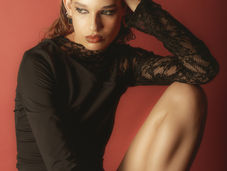In Conversation with Haroula Rose, director of Once Upon a River
- Saffron Brown Davis
- May 7, 2021
- 4 min read
Updated: May 13, 2021
Haroula Rose’s multi-award winning ‘Once Upon a River’ is a poignant unfolding of the unrelenting adversities faced by Margo Crane, played by Kenadi DelaCerna, a Native American teenager and gifted markswoman living in 1970s rural Michigan. When a sequence of traumatic life events compel her to flee home and embark on a voyage through the wilderness in pursuit of her elusive mother, Margo envelops us entirely in her world as we witness her arduous journey of self-discovery and healing.
As immersive sonically as it is visually, ‘Once Upon a River’ features a stunning folk-influenced soundtrack by Will Oldham (Bonnie ‘Prince’ Billy), JD Souther, Rodney Crowell and Bridget St John and is scored by Zac Rae of ‘Death Cab For Cutie’.

What was your first encounter with the original story written by Bonnie Jo Campbell like and what drew you to it?
I fell in love with the novel because I thought it was such a great take on the ‘American Road’ movie. Normally we see young boys like Huck Finn or Tom Sawyer going on these adventures in the wilderness, so I thought it was really cool that the story was based on a young woman coming of age who inhabits both the masculine and the feminine and has a certain kind of awakening where, in finding her mother, she realises what she wants and doesn't want for herself in her own life. So there was just a lot thematically about the story that I thought was strong and unusual, which made me feel really excited about telling it on screen.
What was it like as a director to be filming in nature?
It's really lovely to be able to bring your environment on screen. It can be so compelling, because the wilderness is like a character in and of itself; you're interacting with it and you're really in [Margo’s] perspective and feeling her loneliness and her union with nature as well as her comfort there. In many ways, I feel like she is quite feral in some sense. I kind of love that about her, the fact that she seems more comfortable on her own than in a typical community or society and that she's kind of an outsider, but she finds her way and her people. It was really inspiring for me to capture nature, especially at that time of year, which I think you guys can relate to because it's very moody and the Midwest is very powerful in that sense.

How did you go about selecting the artists featured on the score and soundtrack?
Zac Rae is in a lot of bands and he’s just an amazing musician overall. He has scored my short films before and a pilot that I shot. He was actually one of the first people to read the script and start toying around with sounds for the score and he had sent me some possible themes and cues that I could have on hand as a tool for when I was working with actors, so before a highly emotional scene I could say something like, “This is what the mood is here...” and it was really useful to have that.
Also, a couple of the guys who were considered to play Smoke said that even though they weren't able to act in the film, they would still like to write some songs for it, which they did. It all felt very organically related in that way. It was a really beautiful convergence for me to be able to write some of the music as well and have it all feel like it was part of the same sonic family.
Were there any ways in which your musical background informed the approach you took to directing?
I think that being a musician or performer helps you because you know how to make people feel comfortable and you are in a good, open space to collaborate. Going into it, I already knew what I wanted to achieve, but I also think there's this really cool combination of what has to happen in the moment too. In other words, you can be open to an idea that comes from someone else, but you have a determination to get what you initially envisioned as well. Plus, if you are a performer, you can usually empathise with people and make sure that they are feeling comfortable enough to be really open, share their ideas and come up with something that everyone is into.
What in particular would you like audiences to take away from the film?
I hope people feel uplifted and hopeful despite the more ‘difficult’ scenes. Margo’s is a very odd and unlikely journey but again that feels like what we’re all on, so I hope that makes people feel less alone. I hope it's provocative too, in terms of what it says about the cost of freedom for Margo and many other women.
Absolutely. I really sympathise with Margo because she endures so much. Her situation becomes really intense very quickly and there are a lot of sensitive topics that are explored through her character, but she shows so much resilience and bravery through it all.
That's how I feel too. She's such an interesting character because she doesn’t want to be defined by the bad things that have happened to her, whether it's conscious or not. Yes, I think she knows how to be resilient and survive and those things ultimately end up making her stronger, but it's hard.
Haroula Rose is set to shoot two more films this year and is currently in the process of mixing her new record, with hopes to tour in the autumn.
























Comments